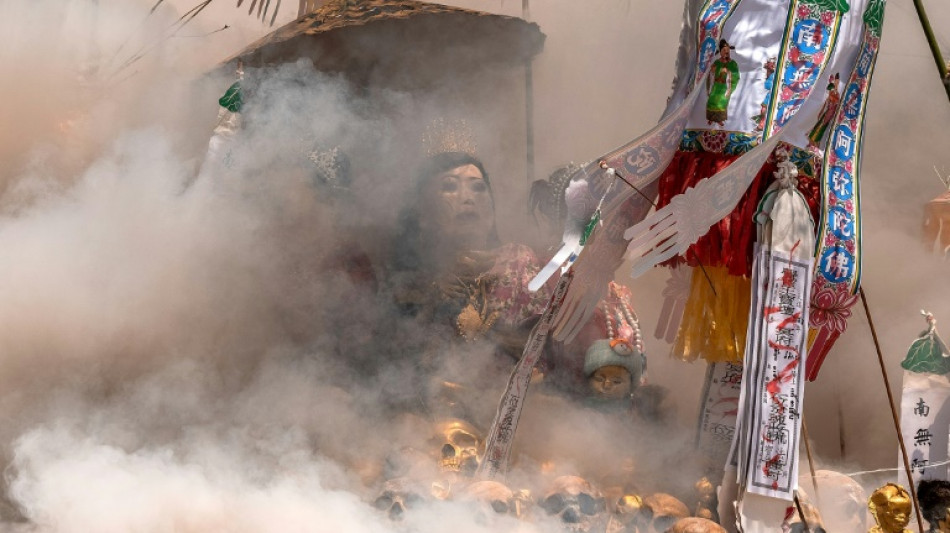
-
 UN Security Council votes to extend DR Congo mission by one year
UN Security Council votes to extend DR Congo mission by one year
-
Family of Angels pitcher, club settle case over 2019 death

-
 US university killer's mystery motive sought after suicide
US university killer's mystery motive sought after suicide
-
Rubio says won't force deal on Ukraine as Europeans join Miami talks

-
 Burkinabe teen behind viral French 'coup' video has no regrets
Burkinabe teen behind viral French 'coup' video has no regrets
-
Brazil court rejects new Bolsonaro appeal against coup conviction

-
 Three-time Grand Slam winner Wawrinka to retire in 2026
Three-time Grand Slam winner Wawrinka to retire in 2026
-
Man Utd can fight for Premier League title in next few years: Amorim

-
 Pandya blitz powers India to T20 series win over South Africa
Pandya blitz powers India to T20 series win over South Africa
-
Misinformation complicated Brown University shooting probe: police

-
 IMF approves $206 mn aid to Sri Lanka after Cyclone Ditwah
IMF approves $206 mn aid to Sri Lanka after Cyclone Ditwah
-
US halts green card lottery after MIT professor, Brown University killings
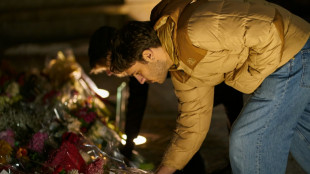
-
 Stocks advance as markets cheer weak inflation
Stocks advance as markets cheer weak inflation
-
Emery says rising expectations driving red-hot Villa

-
 Three killed in Taipei metro attacks, suspect dead
Three killed in Taipei metro attacks, suspect dead
-
Seven Colombian soldiers killed in guerrilla attack: army

-
 Amorim takes aim at Man Utd youth stars over 'entitlement'
Amorim takes aim at Man Utd youth stars over 'entitlement'
-
Mercosur meets in Brazil, EU eyes January 12 trade deal

-
 US Fed official says no urgency to cut rates, flags distorted data
US Fed official says no urgency to cut rates, flags distorted data
-
Rome to charge visitors for access to Trevi Fountain

-
 Spurs 'not a quick fix' for under-fire Frank
Spurs 'not a quick fix' for under-fire Frank
-
Poland president accuses Ukraine of not appreciating war support

-
 Stocks advance with focus on central banks, tech
Stocks advance with focus on central banks, tech
-
Amorim unfazed by 'Free Mainoo' T-shirt ahead of Villa clash

-
 PSG penalty hero Safonov ended Intercontinental win with broken hand
PSG penalty hero Safonov ended Intercontinental win with broken hand
-
French court rejects Shein suspension

-
 'It's so much fun,' says Vonn as she milks her comeback
'It's so much fun,' says Vonn as she milks her comeback
-
Moscow intent on pressing on in Ukraine: Putin

-
 UN declares famine over in Gaza, says 'situation remains critical'
UN declares famine over in Gaza, says 'situation remains critical'
-
Guardiola 'excited' by Man City future, not pondering exit

-
 Zabystran upsets Odermatt to claim first World Cup win in Val Gardena super-G
Zabystran upsets Odermatt to claim first World Cup win in Val Gardena super-G
-
Czechs name veteran coach Koubek for World Cup play-offs

-
 PSG penalty hero Safonov out until next year with broken hand
PSG penalty hero Safonov out until next year with broken hand
-
Putin says ball in court of Russia's opponents in Ukraine talks
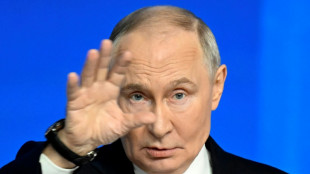
-
 Czech Zabystran upsets Odermatt to claim Val Gardena super-G
Czech Zabystran upsets Odermatt to claim Val Gardena super-G
-
NGOs fear 'catastrophic impact' of new Israel registration rules
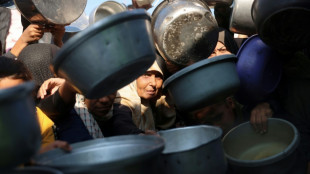
-
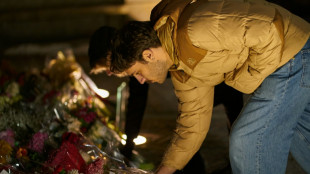 US suspends green card lottery after MIT professor, Brown University killings
US suspends green card lottery after MIT professor, Brown University killings
-
Stocks mixed with focus on central banks, tech
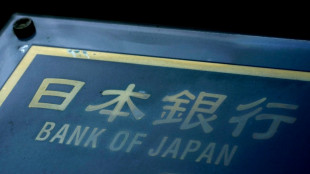
-
 Arsenal in the 'right place' as Arteta marks six years at club
Arsenal in the 'right place' as Arteta marks six years at club
-
Sudan's El-Fasher under the RSF, destroyed and 'full of bodies'
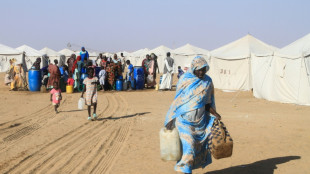
-
 From farms to court, climate-hit communities take on big polluters
From farms to court, climate-hit communities take on big polluters
-
Liverpool have 'moved on' from Salah furore, says upbeat Slot

-
 Norway crown princess likely to undergo lung transplant
Norway crown princess likely to undergo lung transplant
-
Iraq negotiates new coalition under US pressure
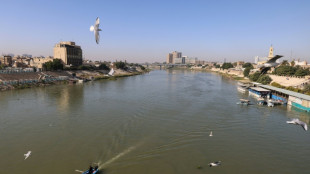
-
 France's budget hits snag in setback for embattled PM
France's budget hits snag in setback for embattled PM
-
Putin hails Ukraine gains, threatens more, in annual press conference
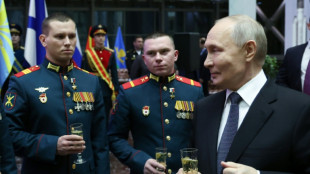
-
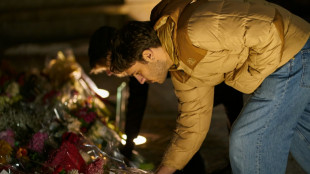 US suspends green card lottery after Brown, MIT professor shootings
US suspends green card lottery after Brown, MIT professor shootings
-
Chelsea's Maresca says Man City link '100 percent' speculation

-
 Dominant Head moves into Bradman territory with fourth Adelaide ton
Dominant Head moves into Bradman territory with fourth Adelaide ton
-
Arsenal battle to stay top of Christmas charts


Skulls, smoke and spirits: Thai ceremony for the unclaimed dead
Flames crackle through piles of hundreds of human skulls and thick grey smoke pours into the Thai sky in a moment as spiritually significant as it is gruesome.
The Lang Pacha ceremony is observed by Thais of Chinese descent to give a dignified funeral to the unclaimed dead.
In Thailand, hospitals hand unidentified bodies and those with no-one to give them appropriate last rites to local foundations.
These then bury the corpses in graveyards, sometimes for several years, before a weeks-long ritual when they are exhumed, cleaned and all cremated together.
In Buddhist belief, the spirits of the uncremated remain trapped between worlds and cannot be reincarnated until monks perform the proper rites.
"Spirits without cremation still roam," said Pisit Pongsirisupakul, vice president of the Dhamma of Buddha Nakhon Ratchasima Foundation, which organised the event.
"They suffer and they can't be reborn. We help them move on, and that's why this is an act of merit," he told AFP.
Buddhists believe death marks the beginning of a new life, and making merit ensures a better rebirth.
"It's not scary," said Pisit. "When people die, we all look the same -- like skeletons."
- Empty eyesocket -
The ritual begins with volunteers digging up the graves -- the event's name translates as "cleaning the jungle" -- before brushing dirt and flesh from the remains and washing them in holy water boiled with tea leaves.
One man scrubbed out an empty eyesocket firmly with a toothbrush.
The scene is incongruously cheerful: wearing blue surgical gloves, Pimjai Sornrach grinned broadly as she held a skull, declaring "it's so good, it's so good", while her smiling friend held up a femur for the camera.
"I just want to be there whenever there's an event like this," said Pimjai, a 54-year-old shopkeeper.
She started volunteering at 17 after seeing two people killed in a hit-and-run, and says the ritual is about helping others as well as earning merit.
"My heart tells me to go."
Accumulated over the course of a decade, some of the 600 corpses were only recently deceased and the smell of death hung over the foundation complex in Nakhon Ratchasima province, north of Bangkok.
Some will have been Alzheimer's patients who wandered from their homes, never to be found by their families, others include road accident victims or undocumented labourers from Myanmar.
Laid out to dry, the remains are combined and divided up by bone type and laid out on mats or piled in buckets -- hundreds of skulls, leg bones and others.
It is a family occasion -- two young girls sat alongside rows of skulls, each holding an anonymous head in their lap.
- 'Peace of mind' -
In the days running up to the ceremony's climax, volunteers press gold leaf onto the bones, and reconstruct faces on a few.
Each set of bones is loaded by turn into two separate crematorium towers -- one for the men, one for the women -- with the skulls on top completing the stacks.
Monks chant and pray before the flames are lit. Later the ashes from each tower will be interred in a graveyard.
Thitiwat Pornpiratsakul, 63, began volunteering after he, his wife and two sons survived a bus crash 20 years ago.
"Our bus flipped over, and no one came to help us," he recalled. "My wife and children were with me. We felt helpless."
Since recovering, he has taken part in the ritual every year.
"My family and I have stayed healthy, and I believe it's because we help in this ceremony," he said.
Organisers say the event not only honours the dead, but also highlights a need for legal reform.
Pisit has long campaigned for government support to expand DNA testing and connect the civil registration system to police forensics to help identify the unclaimed.
"We need a centralised database where families can search by ID and find their loved ones," he said.
K.Brown--BTB

